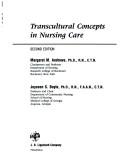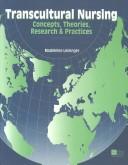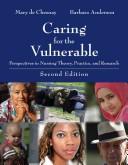| Listing 1 - 10 of 77 | << page >> |
Sort by
|
Book
ISBN: 9781608310753 Year: 2012 Publisher: Philadelphia Wolters Kluwer / Lippincott Williams & Wilkins
Abstract | Keywords | Export | Availability | Bookmark
 Loading...
Loading...Choose an application
- Reference Manager
- EndNote
- RefWorks (Direct export to RefWorks)

ISBN: 0397551150 Year: 1995 Publisher: Philadelphia Lippincott
Abstract | Keywords | Export | Availability | Bookmark
 Loading...
Loading...Choose an application
- Reference Manager
- EndNote
- RefWorks (Direct export to RefWorks)
Book
ISBN: 9781975110673 1975110676 Year: 2020 Publisher: Philadelphia Wolters Kluwer
Abstract | Keywords | Export | Availability | Bookmark
 Loading...
Loading...Choose an application
- Reference Manager
- EndNote
- RefWorks (Direct export to RefWorks)
"When preparing today's students to become tomorrow's nurses, Wolters Kluwer knows you need a Transcultural Nursing textbook that you can trust. Transcultural Concepts Care, 8th Ed, is a comprehensive text that provides nurses with the theoretical foundations for transcultural nursing. The text features transcultural theories, models, & research Transcultural Nursing Scholars Margaret M. Andrews, Joyceen S. Boyle, and John W. Collins emphasize the need for effective & efficient communication, client- and patient-centered teamwork, & collaboration among members of the interprofessional health care team. Their approach to transcultural nursing is rooted in cultural assessment, which is special allows students to care for individuals, groups, & communities from any & all cultural groups they might encounter in their professional careers"--
Transcultural nursing --- Transcultural Nursing --- Culturally Competent Care
Book
ISBN: 9780323083799 Year: 2013 Publisher: St. Louis, Mo. Elsevier/Mosby
Abstract | Keywords | Export | Availability | Bookmark
 Loading...
Loading...Choose an application
- Reference Manager
- EndNote
- RefWorks (Direct export to RefWorks)
Book
ISBN: 0132328925 9780132328920 Year: 2009 Publisher: Harlow, England New York Pearson Education
Abstract | Keywords | Export | Availability | Bookmark
 Loading...
Loading...Choose an application
- Reference Manager
- EndNote
- RefWorks (Direct export to RefWorks)
Good communication is an essential part of delivering effective nursing care. Nursing students work in a variety of multicultural settings and therefore it is imperative that they fully understand their own cultural context and that of others. This text illustrates the important differences between cultures and how these differences can enhance practical nursing. Through the comprehensive use of case studies and interactive exercises, the book invites students to reflect on their own knowledge and skills about culture so that they can learn to communicate in a more effective and culturally sensitive way. All theory is applied to nursing practice to demonstrate how situations can arise and be dealt with appropriately whilst working on clinical placement. This text is written for students studying the CFP at Year 1. Communication will be studied either as part of a Professional Issues module, or Nursing Practice.
Communication in nursing --- Transcultural nursing --- Transcultural Nursing --- Communication --- Nursing Theory

ISBN: 0070376603 Year: 1995 Publisher: New York McGraw-Hill
Abstract | Keywords | Export | Availability | Bookmark
 Loading...
Loading...Choose an application
- Reference Manager
- EndNote
- RefWorks (Direct export to RefWorks)

ISBN: 076375109X 9780763751098 Year: 2008 Publisher: Sudbury: Jones and Bartlett,
Abstract | Keywords | Export | Availability | Bookmark
 Loading...
Loading...Choose an application
- Reference Manager
- EndNote
- RefWorks (Direct export to RefWorks)
Nursing --- Transcultural nursing --- Nursing --- Nursing
Book
Year: 2013 Publisher: Oslo : Norwegian Knowledge Centre for the Health Services,
Abstract | Keywords | Export | Availability | Bookmark
 Loading...
Loading...Choose an application
- Reference Manager
- EndNote
- RefWorks (Direct export to RefWorks)
The number of immigrants with minority language background has increased over the last decades in Norway, in particular in larger cities. In consequence, a higher share of children, young people and families with minority-language and immigrant background might need to communicate with public service providers. The question we address in this report is whether interventions to facilitate communication between minority language children, young people or families with immigrant background and public services are effective. Examples of such kind of interventions are different types of interpretation services or foreign language training programs. We included four studies in total, addressing families with children or parents with minority language backgrounds; we found no studies exclusively addressing youth with minority language backgrounds.s1. We identified one single study that compared the effect of two different training programs of English as a second language on Spanish speaking parents' English skills and parents' involvement in their children's school work. The findings indicate that an extended English as a Second Language Class (ESL) had a higher impact on parents' involvement in students' schoolwork and parents' English skills than an ESL-course focussing solely on isolated language skills. This is a promising finding. As this was a small-scale study with methodological limitations, we need similar studies with a more robust design, to draw any conclusions.2. Three studies conducted within the health services compared the effect of different interpretation services (in-person interpreter, telephone interpreter, ad hoc interpreter) or bilingual personnel on different outcomes observed for families. None of these interventions appeared to stand out in favour of another. Thus, we cannot draw any conclusion on the effect in favour of one particular interpretation service.3. We did not find any studies on interventions measuring the effect on the degree of trust.
Book
Year: 2013 Publisher: Oslo : Norwegian Knowledge Centre for the Health Services,
Abstract | Keywords | Export | Availability | Bookmark
 Loading...
Loading...Choose an application
- Reference Manager
- EndNote
- RefWorks (Direct export to RefWorks)
The number of immigrants with minority language background has increased over the last decades in Norway, in particular in larger cities. In consequence, a higher share of children, young people and families with minority-language and immigrant background might need to communicate with public service providers. The question we address in this report is whether interventions to facilitate communication between minority language children, young people or families with immigrant background and public services are effective. Examples of such kind of interventions are different types of interpretation services or foreign language training programs. We included four studies in total, addressing families with children or parents with minority language backgrounds; we found no studies exclusively addressing youth with minority language backgrounds.s1. We identified one single study that compared the effect of two different training programs of English as a second language on Spanish speaking parents' English skills and parents' involvement in their children's school work. The findings indicate that an extended English as a Second Language Class (ESL) had a higher impact on parents' involvement in students' schoolwork and parents' English skills than an ESL-course focussing solely on isolated language skills. This is a promising finding. As this was a small-scale study with methodological limitations, we need similar studies with a more robust design, to draw any conclusions.2. Three studies conducted within the health services compared the effect of different interpretation services (in-person interpreter, telephone interpreter, ad hoc interpreter) or bilingual personnel on different outcomes observed for families. None of these interventions appeared to stand out in favour of another. Thus, we cannot draw any conclusion on the effect in favour of one particular interpretation service.3. We did not find any studies on interventions measuring the effect on the degree of trust.
Book
ISBN: 9781975222963 Year: 2024 Publisher: Philadelphia, PA Wolters Kluwer
Abstract | Keywords | Export | Availability | Bookmark
 Loading...
Loading...Choose an application
- Reference Manager
- EndNote
- RefWorks (Direct export to RefWorks)
"The chapters in this book, now in its ninth edition, reveal this scholarship by continuing to illuminate the application of the authors' Transcultural Interprofessional Practice (TIP) Theory and Model introduced in the seventh edition. The TIP Model captures and communicates the widest range of the rich foundational knowledge of cultural and transcultural nursing knowledge for diverse populations, such as addressing multicultural and population health across the lifespan, including the health of indigenous groups, palliative and end-of-life care, seeking person/patient/client-centered contributions to transcultural nursing assessments, transcultural maternal-child care, pursuing cultural understanding of mental healthcare, creating culturally competent healthcare organizations, addressing environmental science and social justice, identification and assessment of transcultural religious, ethical and moral foundations, animal contributions, and furthering global health via cognizance of the United Nations sustainable development goals and many others"-- "Rooted in cultural assessment and trusted for its proven approach, Transcultural Concepts in Nursing Care, 9th Edition, is your students' key to ensuring safe, ethical, and effective care to diverse cultures and populations. This comprehensive text helps students master transcultural theories, models, and research studies while honing the communication and collaboration skills essential to success in today's changing clinical nursing environment. Incorporating the expertise of an expanded team of established pioneers in the transcultural nursing field, this updated 9th Edition provides a contemporary framework for culturally competent nursing care. Content has been extensively reviewed and revised to reflect the evolving healthcare delivery system; new research studies and theoretical advances; an emphasis on effective communication, teamwork, and collaboration; and the latest clinical guidance on how nurses and other healthcare providers can use culturally competent skills to improve the care of clients, families, groups, and communities. "--
| Listing 1 - 10 of 77 | << page >> |
Sort by
|

 Search
Search Feedback
Feedback About UniCat
About UniCat  Help
Help News
News